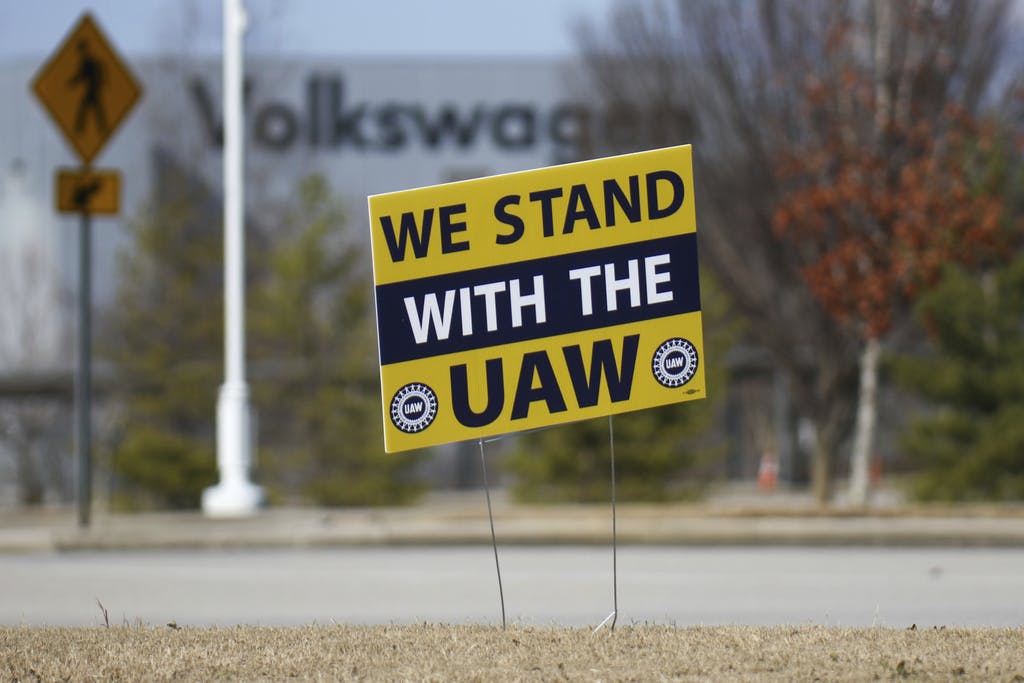United Auto Workers Union Seeks Inroads in Right-To-Work Southern States With Votes at Tennessee, Alabama Plants
‘The movement was inspired by the record contracts UAW members won during last year’s Stand Up Strike against the Big Three auto companies,’ the United Auto Workers says.

Employees at a Volkswagen plant at Chattanooga, Tennessee, are set to vote in a union election next week, an election which is part of a larger push by the United Auto Workers to unionize plants in the largely anti-union Southern states.
In late March, the National Labor Relations Board set the election timeline for the Chattanooga plant to occur between April 17 and 19, with the vote counting starting at 8 pm on the 19th.
This is the third attempt the workforce at the plant has made to unionize in the past decade, with organizers failing to win unionization at the plant in 2014 and 2019.
This time, however, the winds appear to be in the UAW’s sails. Last year, the UAW delivered major wins for its members after a “stand up” strike at the Big Three automakers, including, alongside higher wages, the right to organize at electric vehicle plants and the reopening of a shuttered Stellantis plant at Belvidere, Illinois.
“The movement was inspired by the record contracts UAW members won during last year’s Stand Up Strike against the Big Three auto companies,” the UAW said in a statement.
The UAW is also under new leadership this go around, with its president, Shawn Fain, representing a departure from the old guard, which had been marred by corruption scandals and unfavorable contracts.
While the National Labor Relations Board requires that a union show that at least 30 percent of employees at a facility support unionization, there are signs that support at Chattanooga could be much higher.
A spokesman for the UAW declined to comment on the union’s current level of support at Chattanooga, but the union has previously said that it aims for 70 percent support before petitioning the NLRB for an election.
The coming election at Chattanooga is also only one battle in a broader campaign to organize auto industry labor across the right-to-work South.
“Over 10,000 non-union autoworkers have signed union cards in recent months, with public campaigns launched at VW, Mercedes in Vance, Alabama, Hyundai in Montgomery, Alabama and Toyota in Troy, Missouri,” the UAW said in a statement. “Workers at more than two dozen other facilities are also actively organizing.”
Other key sites of organization efforts include a Mercedes plant outside Tuscaloosa, where more than half of employees have signed cards, and the Montgomery Hyundai plant, where 30 percent of employees have signed cards.
General Motors plants at Spring Hill, Tennessee, and at Arlington, Texas, are also home to nascent organizing movements, as are Ford’s plants at and around Louisville. According to the union, organizers are also preparing for the opening of Ford’s upcoming battery plants at Memphis and elsewhere.
The director of the Center for Labor and Employment Law at New York University’s law school, Samuel Estreicher, tells the Sun that the union organizing in the south is key to its future.
“Organizing auto plants is critical to the union’s future in this country,” Mr. Estraicher says. “The Union needs to be mindful of the different culture and adapt to that environment.”
For decades, manufacturers have been shifting production to the South, drawn by tax incentives, lower costs for land and labor, and the region’s political hostility to unions.
Many of the plants opened in the South were foreign manufacturers like BMW, Honda, or Volkswagen, though, in recent years, American manufacturers have also looked to the South, with some 66 percent of EV manufacturing jobs going to Southern states, according to S&P Global.
Since 1990, S&P Global reports that the share of auto jobs in the South has risen to 30 percent from about 15 percent, while the Midwest’s share has fallen to 45 percent from 60 percent.
As for the election at the Volkswagen plant, the company said in a statement to the Detroit Free Press that “We respect our workers’ right to a democratic process and to determine who should represent their interests.”
“We fully support an NLRB vote so every team member has a chance to vote in privacy on this important decision,” Volkswagen spokesman Micahel Lowder said. “Volkswagen is proud of our working environment in Chattanooga that provides some of the best-paying jobs in the area.”
The union, however, has accused the company of attempting to intimidate its employees to dissuade them from unionizing. In December, employees filed an unfair labor practice complaint against the company, accusing it of interfering with their efforts and spying on pro-union employees.
In a letter to management, a coalition of union organizers and local religious leaders said they were “deeply concerned” by reports coming from the Chattanooga plant, noting that it is “the only Volkswagen plant globally that does not have a union.”
In a statement, Volkswagen denied “any claims of union-busting, intimidation, or illegal violations of worker rights at our Chattanooga plant.”
“We respect our workers’ right to decide the question of union representation,” the company said in a statement. “And we remain committed to providing accurate information that helps inform them of their rights and choices.”
Neither Volkswagen nor the UAW immediately responded to a request for comment from the Sun.

